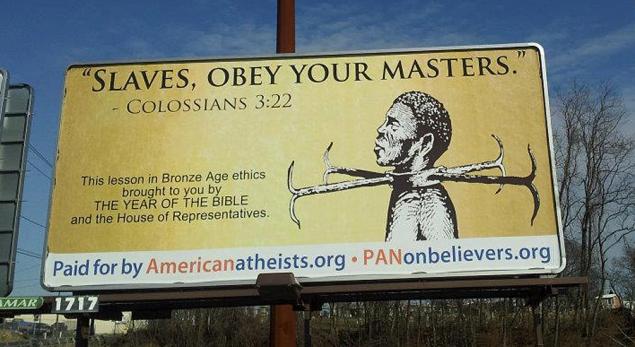I don’t care who does it; it makes me crazy.
The sacrifice of truth for the sake of argument.
This billboard is a case in point.
In an attempt to discredit the Bible, the makers of this billboard equate first-century slavery with American slavery that ended in the 18th century.
Further, this billboard illustrates the hermeneutical crime of “proof-texting,” and therefore missing the entire point of Colossians 3:22.
The device presented on the billboard was used in the Americas a few hundred years ago. The hooks protruding from the collar “are placed to prevent an escapee when pursued in the woods and to hinder them from laying down the head to procure rest” (reference). This is one of the ugliest faces of one of the ugliest periods of human history.
First-Century Slavery
Many centuries separate this slavery from that of the first-century slavery:
In the first century, slaves were not distinguishable from free persons by race, by speech or by clothing; they were sometimes more highly educated than their owners and held responsible professional positions; some persons sold themselves into slavery for economic or social advantage; they could reasonably hope to be emancipated after ten to twenty years of service or by their thirties at the latest; they were not denied the right of public assembly and were not socially segregated (at least in the cities); they could accumulate savings to buy their freedom; their natural inferiority was not assumed. —Murray Harris, Slave of Christ: A New Testament Metaphor for Total Devotion to Christ, NSBT (IVP, 2001), 44.
I am not saying that slavery in the Roman world was equivalent to staying at an all-inclusive resort, but it is irresponsible to evoke all the repugnance of post-Enlightenment slavery when talking about the ancient practice of bond-servanthood.
Does St. Paul Advocate Slavery?
Although this comparison is unfair, it really isn’t the point, because Paul is not advocating slavery even of the Roman variety.
When I was in grade school and I felt that the teacher had treated me unfairly, my parents weren’t nearly as concerned with the unfairness of the teacher as with my response to it. They made it clear to me that the general principles regarding my relationship with those in authority were still in play. Like my parents, Paul has other priorities and they are not really all that obscure for those who wish to find them.
The billboard suggests that if Paul were against slavery, he would have preached against it. Since he mentioned it, but didn’t oppose it, he must have been in favour of it.
[click_to_tweet tweet=”Paul must have supported slavery because he mentioned it and didn’t oppose it. Logically, then, the Bible supports slavery in all its forms. #prooftexting #slavery ” quote=”Paul must have supported slavery because he mentioned it and didn’t oppose it. Logically, then, the Bible supports slavery in all its forms.”]
Paul’s Purpose in Colossians 3:22
But Paul’s purpose in Colossians is to explore the implications of a life in Christ, not to reform society. Paul knew that once a person experiences the love and grace of God in Jesus, everything changes. One is no longer a slave to sin but received as a child adopted into the family of the King. We move from slaves to sons and daughters (even if we remain slaves in society).
This message was such a big deal to Paul that he endured treatment worse that most slave would have. He was beaten and imprisoned and eventually executed. Obviously, Paul had other priorities than simply being free.
The makers of the billboard are proof-texting: taking isolated passages of the Bible and use them to justify one’s own views. In Christian circles, proof-texting is considered lazy and irresponsible. When Christians use the Bible in this way they can come up with some of the worst forms of religious evil possible. A case in point, the Christian slave owners in the American south (We’ve seen this recently in the film, 12 Years a Slave: my comments here). Ironically, just like the slave owners, the makers of the billboard are proof-texting; they are taking a verse completely out of context to justify their views.
The “Christian” slave owners are an example of the great evil that can be done when the Bible is used irresponsibly. This type of Biblical misreading results in reprehensible behavior that held justifiably condemned, but also results in charges leveled against Christianity by the critics of religion.
I don’t see how it helps the conversation when the American Atheists and the Pennsylvania Non-Believers engage in the same behavior as the worst of their religious opponents.


Interesting article. Points well made.